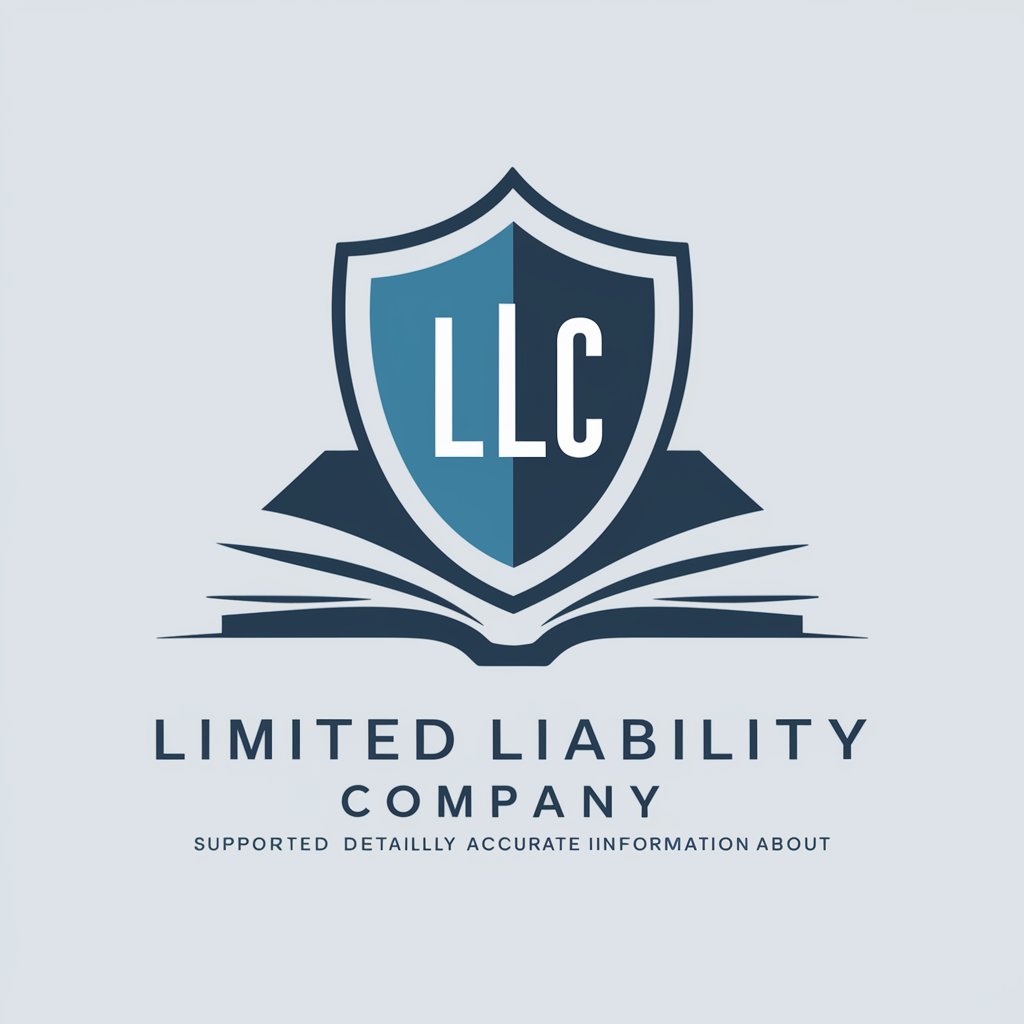Limited Liability Company - LLC Information Guide

Welcome! How can I assist you with LLC information today?
Empowering business through AI-driven LLC insights.
Explain the benefits of forming an LLC.
What are the tax advantages of an LLC?
How does an LLC protect personal assets?
What steps are involved in creating an LLC?
Get Embed Code
Introduction to Limited Liability Company (LLC)
A Limited Liability Company (LLC) is a flexible form of business structure that combines elements of both corporations and partnerships or sole proprietorships. The main appeal of an LLC is that it provides its owners, known as members, with limited liability, meaning that their personal assets are protected from the company's debts and liabilities. Unlike corporations, LLCs are not required to have a board of directors, hold annual meetings, or keep minutes, which reduces paperwork and formalities. LLCs offer tax flexibility; they can choose to be taxed as a sole proprietorship, partnership, S corporation, or C corporation, allowing them to benefit from the most advantageous tax treatment. For example, many LLCs opt for 'pass-through' taxation, where the business's income is only taxed once on the members' personal tax returns, avoiding the double taxation faced by C corporations. LLCs are designed to be adaptable, catering to a wide range of business types from a single-person operation to multi-member organizations. Powered by ChatGPT-4o。

Main Functions of a Limited Liability Company
Limited Liability Protection
Example
For instance, if an LLC incurs debt or faces a lawsuit, the personal assets of the members, such as their homes and bank accounts, are typically not at risk.
Scenario
In a scenario where an LLC operating a cafe faces a lawsuit for a slip-and-fall accident on its premises, the members' personal assets would generally be protected from any legal judgment against the business.
Tax Flexibility
Example
An LLC can elect to be taxed as a disregarded entity, partnership, or corporation, providing flexibility to optimize tax obligations.
Scenario
A freelance graphic designer forms an LLC and chooses to be taxed as a sole proprietor to streamline tax reporting and take advantage of pass-through taxation, reducing overall tax liability.
Operational Flexibility
Example
LLCs are not bound by the strict record-keeping and operational procedures required of corporations.
Scenario
A group of consultants form an LLC and decide to operate without a formal board of directors or annual meetings, allowing them to focus on their consulting work without cumbersome formalities.
Ownership and Profit Distribution
Example
LLCs offer flexibility in how profits are distributed among members, not necessarily based on ownership percentage.
Scenario
In an LLC owned by two partners with unequal investments, they agree to split profits 50-50, recognizing each partner's contributions beyond just financial investment.
Ideal Users of Limited Liability Company Services
Entrepreneurs and Startups
Individuals starting new ventures that require flexibility, minimal regulatory hurdles, and protection of personal assets. LLCs are ideal for these users due to their ease of setup, operational flexibility, and limited liability protection.
Real Estate Investors
Real estate investors often use LLCs to hold property, as this structure protects their personal assets from liabilities associated with property ownership and allows for efficient management of rental income and expenses.
Freelancers and Independent Contractors
For freelancers and contractors looking to legitimize their business, minimize personal liability, and potentially enjoy tax benefits, forming an LLC can provide a formal business structure with significant advantages.
Family Businesses
Families that wish to pool their resources into a business can benefit from forming an LLC. It offers them the ability to manage their business collectively while protecting individual members' personal assets from business liabilities.

How to Use Limited Liability Company Information Guide
Start with YesChat
Begin by visiting yeschat.ai for a comprehensive introduction to LLCs, offering a free trial without the necessity for login or subscription to ChatGPT Plus.
Understand LLC Structure
Learn about the basic structure and features of an LLC, including its flexibility in management, potential tax advantages, and personal liability protection.
Identify Your Needs
Evaluate your specific business needs to determine how forming an LLC can best serve your goals, considering factors like taxation, ownership structure, and liability concerns.
Compliance and Regulations
Familiarize yourself with the compliance requirements and regulations for LLCs in your state, including necessary filings, fees, and ongoing obligations.
Seek Professional Advice
Consider consulting with a legal or financial professional to get tailored advice on forming and operating an LLC, ensuring your business is set up for success.
Try other advanced and practical GPTs
iOS Unit Test Helper
Elevate iOS Testing with AI

Lettered Love meaning?
Empowering Love Through AI

Jazz Harmony Helper
Empower Your Jazz with AI

Agilient
Empower your team with AI-driven agile solutions.

Social Work Insights
Empowering Social Work with AI Insights

Skelitastic Dystopia
Craft Dystopian Worlds with AI-Powered Skeletons

Insurance Wizard
Simplifying insurance through AI-powered guidance.

Hymne A L'Amour meaning?
Unlock deeper understanding with AI-powered insights.

Web Design Helper
Empowering Your Web Design Journey with AI

Image Paladin
Craft Your Fantasy, Visualize Your Adventure

Cyber Security GPT
Demystifying Cybersecurity with AI

Adventure GPT
Empowering your adventures with AI

Limited Liability Company FAQs
What is a Limited Liability Company?
A Limited Liability Company (LLC) is a business structure that combines the liability protection of a corporation with the tax flexibility and operational ease of a partnership or sole proprietorship.
How is an LLC taxed?
LLCs enjoy a pass-through taxation structure by default, meaning the business itself is not taxed. Instead, profits and losses are passed through to the owners (members), who report them on their personal tax returns.
What are the advantages of forming an LLC?
Forming an LLC provides personal liability protection for its owners, potential tax benefits, operational flexibility, and credibility with customers and vendors.
Can LLCs be owned by non-U.S. citizens?
Yes, there are no citizenship or residency restrictions for LLC owners. Non-U.S. citizens can form or be members of an LLC in the United States.
How many people are needed to form an LLC?
Most states allow a single individual to form an LLC. There's no maximum number of members, but the IRS may classify an LLC differently for tax purposes if it has a large number of members.
